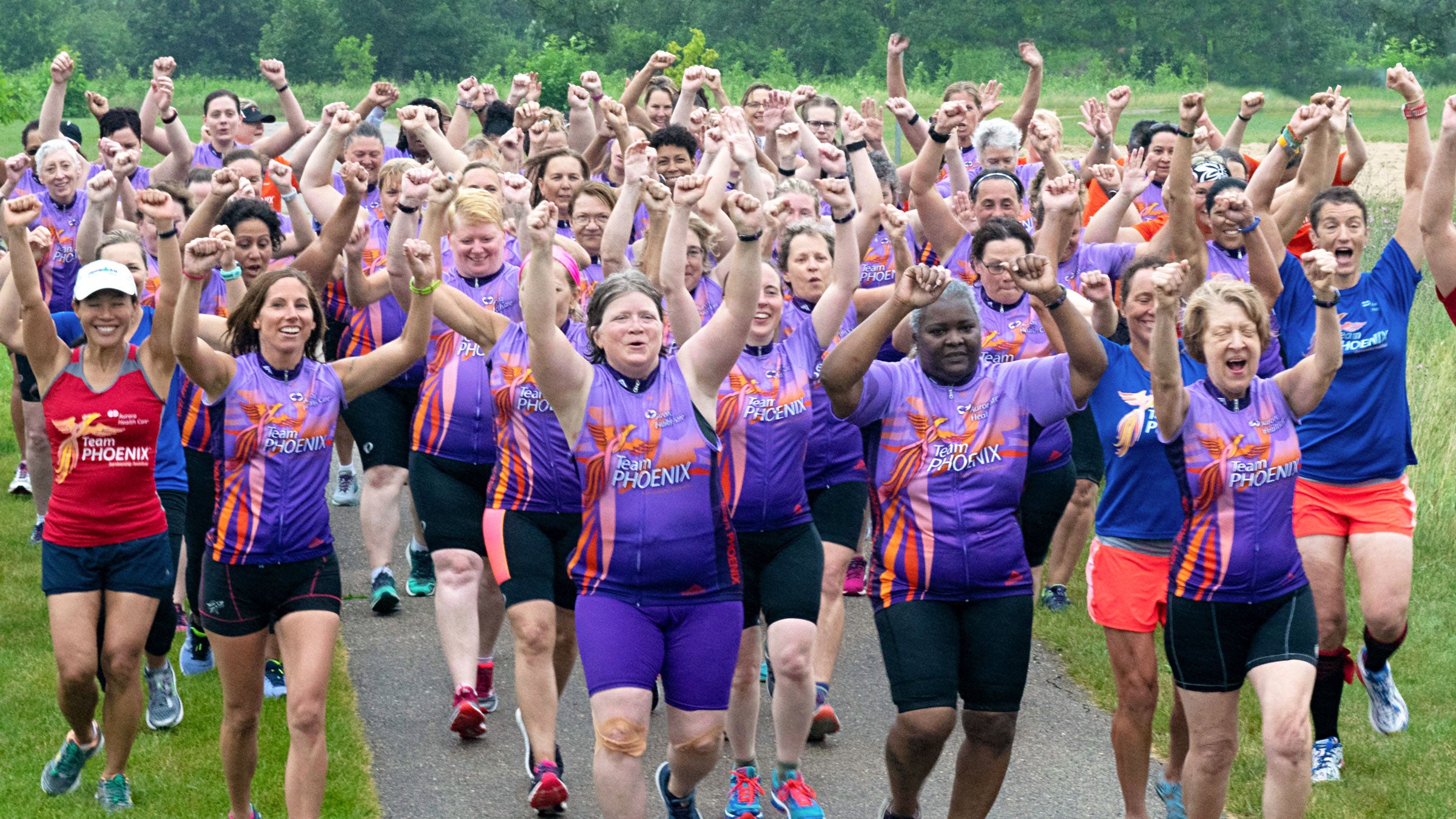Club Hub: Team Phoenix

What would happen if doctors wrote a prescription for “swim-bike-run”? At Aurora Sinai Medical Center in Milwaukee, Wisconsin, they’re doing just that–and the results are astounding. Team Phoenix, a triathlon program for breast cancer patients, is part of a unique program using triathlon to redefine survivorship.
The program began in 2010, when triathlete and breast oncology surgeon Dr. Judie Tjoe noticed the strong metaphorical connection between surgery, chemotherapy, and radiation with swim, bike, and run. But unlike the former, the latter could be presented as a choice, thus giving patients the opportunity to play an active role–figuratively and literally–in their treatment and recovery.
Tjoe developed the program with cancer rehabilitation specialist Leslie J. Walke, who recruited coaches and medical experts to provide oversight for a 14-week training program for cancer patients and survivors, culminating in a sprint triathlon. What started out as a test run with 13 patients has expanded into the 300-strong Team Phoenix, all of them women who have undergone (or are currently undergoing) treatment for ductal carcinoma in situ or other types of invasive cancer.
“Cancer takes away something from people that we in healthcare can’t give back, and that’s where Team Phoenix comes in,” says Waltke. “It helps with empowerment; it helps these women trust their bodies again and take physical control again after losing so much through cancer treatment.”
There are many documented benefits of exercising while undergoing treatment for cancer, including reduced depression and anxiety, increased energy and strength, and reduced pain. Exercise also improves health outcomes for cancer patients during and after treatment. Yet studies show that even when cancer survivors want to exercise, they often lack the skills, knowledge, equipment, and support to safely do so. Team Phoenix steps in by removing those barriers and addressing the unique concerns of patients and survivors.
“Team Phoenix is unique because it provides reassurance to apprehensive survivors by offering a medically overseen training program that utilizes volunteer medical professionals, prescribed training plans, and professional coaches providing each athlete with a safe and successful training and sprint triathlon experience,” says Ilka Hoffins, Team Phoenix program director.
To ensure every athlete has the resources to participate in the program, a local bike shop, Wheel and Sprocket, loans bikes for free to Team Phoenix members; a local gym, Xperience Fitness, offers a complimentary fitness membership for swim training; Final Surge offers an online training platform. The training plans are professionally designed to offer each discipline (swim, bike, run and strength) at three levels: beginner, intermediate, and advanced. Prior to COVID-19 social distancing guidelines, athletes would join together for group workouts twice a week while individually following prescribed training plans the remaining days of the week. Currently, the team meets up virtually. “We have athletes that learn to swim during our program, and others that were on the college swim team. Some will run the 5k in a sub-7 minute mile, and others are building up to meet the challenge of walking the full distance.” Alumnae of the program join in as well – many who successfully complete treatment and their first triathlon with Team Phoenix continue to train and race with the group while serving as mentors for the new members.
Despite the varying levels of experience within the group, the team is a cohesive unit, bonded together by their experience fighting cancer. “Training for a triathlon alongside other incredible women – all cancer survivors of varied ages and backgrounds, surrounded and supported by dozens of medical staff and incredible coaches, all working together to train our damaged bodies and our bruised hearts, has helped me start to come out the other side of this insane cancer journey,” says Sarah Zarzynski, a 2019 alumnae of Team Phoenix.
The camaraderie of Team Phoenix is particularly evident in their culminating race-day tradition: Athletes complete the triathlon individually, then wait until the final Team Phoenix athlete approaches the finish line. At that point, all Team Phoenix members, coaches, and medical support volunteers run across the finish line together in celebration of their accomplishment as a team.
Because of the success of the program, many cancer treatment centers have requested information on setting up satellite programs of Team Phoenix (expansions are currently on hold during the COVID-19 pandemic). Studies are also underway at Aurora Research Institute, including a five-year research study of Team Phoenix members tracking the effects of fitness on biomarkers associated with quality of life and survivorship. But feedback from athletes, their family members, and their clinicians already shows the swim-bike-run prescription is working: survivor-athletes are happier, healthier, more confident and able to thrive as they integrate back into their daily life and community.
“We are helping survivors gain back their confidence, fitness, and zest for life,” says Hoffins. Waltke agrees: “What they gain from the Team Phoenix training program lasts far beyond the 14 weeks.”